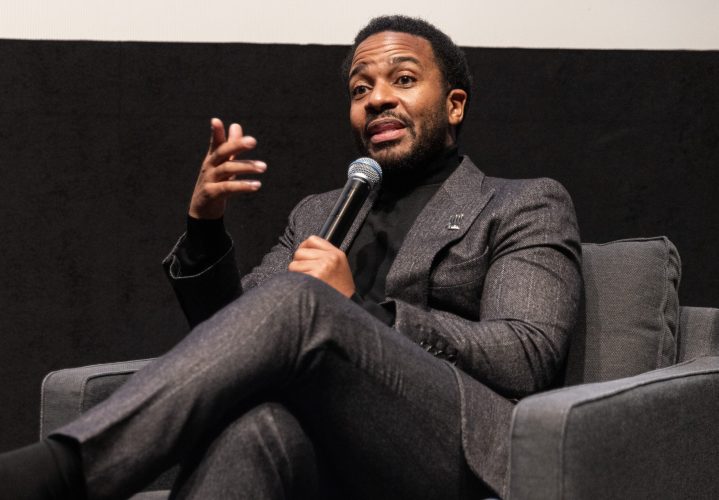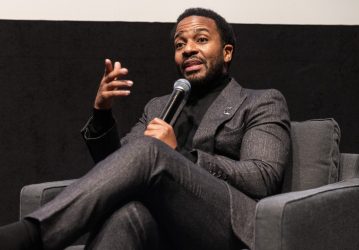Every actor knows what it’s like to see several scenes they grew fond of left on the cutting room floor. Sometimes the discarded scenes, which outline their character in greater detail, are the exact reasons they signed on to the project in the first place. Such was the case for André Holland, who recounted one such instance from Brian Helgeland’s “42.” During an intimate talk at the Gene Siskel Film Center on Saturday night with Glenn Davis, Steppenwolf Theatre Company Co-Artistic Director, the esteemed actor recounted a difficult lesson he learned from “42” while accepting the Chicago International Film Festival’s Artistic Achievement Award.
“42” is the Jackie Robinson biopic starring Chadwick Boseman as the titular historical baseball player who broke the game’s color barrier. Also in the film is Harrison Ford as Branch Rickey, the aggressive baseball executive who signed Robinson to the Brooklyn Dodgers. Holland plays a supporting role as Wendell Smith, the undeterred, scholarly journalist from the Pittsburgh Courier who worked tirelessly alongside Robinson to ensure the ballplayer could hold up to the onslaught of racism he faced in white baseball. The role was a turning point for Holland, leading to stellar turns in “The Knick,” “Selma,” “Moonlight,” “High Flying Bird,” and “Passing.”
When asked by Davis if he felt an importance in telling historical Black stories, Holland recalled to the crowd at the Film Center that he initially met with Smith’s widow over lunch before shooting. It was a genial meal that gave Holland some background for the activist-minded Smith. The final film, however, left Mrs. Smith gravely disappointed.
“I’m gonna tell y’all the truth,” Holland told the Film Center. The actor explained how, long before Rickey chose Robinson to break the color barrier, Smith had tirelessly worked through his writing to get several Black baseball players from the Negro Leagues tryouts with major league teams. Usually, when these teams acquiesced, the tryouts would be merely perfunctory (at best, a secretary might attend). Robinson’s entry to the majors resulted from Smith’s multi-year push. That truth “was in the script when I read it. We understood Wendell’s advocacy and the history of that,” says Holland.
But Holland also recounted that, when “42” was finished, he received a call from Helgeland explaining that these scenes were cut to shorten the film’s length. Rather than using Smith’s arc, the filmmaker opted to only show Rickey opening a manilla folder and magically finding Robinson’s name as though it was divine intervention, thereby narratively erasing Smith’s earlier efforts.
“That’s why it broke her heart,” explained Holland. “If I’m going to play people, real people, I’ve got to do everything I can to tell the truth about what happened. It’s a form of violence, I think, to obscure the truth.”
There are few, if any, documentaries about Wendell Smith. When he is mentioned, it’s often in relation to Robinson’s story. After working with Robinson, Smith later moved to Chicago where he covered boxing for Chicago Herald-American. He later became the first Black member of the Baseball Writers’ Association of America before passing away at age 58 in 1972 from pancreatic cancer, one month after Robinson’s passing.
To miss a chance to fully contextualize his achievements, even in a film strictly about Robinson, still feels like a missed opportunity.
Despite that aching memory, the night wasn’t entirely serious. It was actually quite light-hearted. Holland and Davis are lifelong friends whose built-in rapport carried an evening filled with laughs and playful ribbing by the two men.
The pair discussed the actor’s early days, from his time bouncing around Paris and London looking for acting work to his audition for NYU. They also talked about the surprising success of Barry Jenkins’ “Moonlight.”
“Nobody thought it was going to be that,” says Holland. “As a matter of fact, my agent asked if I was sure I wanted to do this little movie.”
It was Tarrell Alvin McCraney’s words, the film’s Oscar-winning screenwriter, that gave Holland the confidence to sign on. The pair met at NYU during graduate school, and they would go on to work again when Holland asked McCraney to write the script for the Steven Soderbergh-directed sports drama “High Flying Bird.”
With Holland’s latest film, Titus Kaphar’s soulful artistic exploration, “Exhibiting Forgiveness,” the actor is once again dealing with the weight of portraying someone’s life. “Exhibiting Forgiveness” is the semi-autobiographical drama about Kaphar’s contentious relationship with his abusive father. Holland portrays Tarrell, a painter whose family — his mother Joyce (Aunjanue Ellis-Taylor), wife (Andra Day), and son — must contend with the return of his estranged dad La’Ron (John Earl Jelks).
Holland’s performance has been praised by many (including this writer) and by the site’s own Peyton Robinson, writing, “Tarrell’s self-soothing fidgeting and pacing evoke the young boy still alive within him trying to remain hidden from view, and Holland balances these conflicting identities with a gentle but assertive performance.”
Holland recognizes both the importance of “Exhibiting Forgiveness” and the long path — through learning the responsibility of mirroring real life — it’s taken to get here. “I’m proud of it,” says Holland. “It’s honest work. Nobody was faking it. Nobody was phoning it in.”
A report from this weekend’s tribute to the star of Moonlight and Exhibiting Forgiveness. Read More


